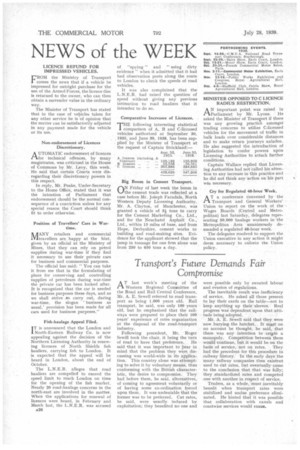Transport's Future Demands Fair Compromise
Page 28

If you've noticed an error in this article please click here to report it so we can fix it.
AT last week's meeting of the Western Regional Committee of the Road and Rail Central Conference, Mr. A. E. Sewell referred to road transport as being 1,000 years old. Rail transport, he said, was only 100 years old, but he emphasized that the railWays were prepared to place their 100 years' experience of rates organization at the disposal of the road-transport industry.
Following precedent, Mr. Roger Sewill took the chair, it being the turn of road to have that preference. He said that it was important to pear in mind that the problem they were discussing was world-wide in its application. This country alone was attempting to solve it by voluntary means, thus conforming with the British characteristic, the desire to compromise. They had before them, he said, alternatives, of coming to agreement voluntarily or of having some co-ordination forced upon them. It was undeniable that the former was to be preferred. Cut rates, he said, were usually induced by exploitation; they benefited no one and were possible only by sweated labour and evasion of regulations.
The inevitable result was inefficiency of service. He asked all those present to lay their cards on the table—not to keep anything up their sleeves. Real progress was dependent upon that attitude being adopted.
Mr. A. E. Sewell said that they were now burying the hatchet. It mnst on no account be thought, he said, that there was any intention to creiate a monopoly. Competition between them would continue, but it would be on the basis of service, not on rates. . They had the precedent for this procedure in railway history. In the early days the many railway companies then existent used to cat rates, but eventually came to the conclusion that that was folly; they standardized rates and competed one with another, in respect of service.
Traders, as a whole, must inevitably benefit when transport rates were stabilized and undue preference eliminated. He hinted that it was possible that collaboration with canals and coastwise services would ensue.












































































